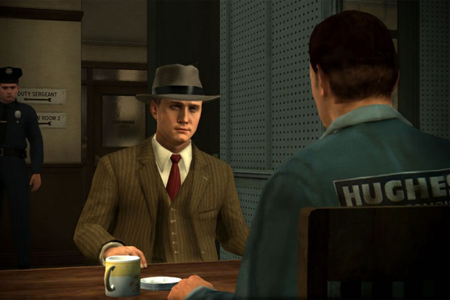Asperger’s Expert Says L.A. Noire Could Be A Teaching Tool?

I need to note that I don’t know very much about Asperger’s outside of the general debris that washes up on our collective pop consciousness. So I’m far from being even adequate in discussing it. However, I have to admit that an Asperger’s expert coming out and discussing L.A. Noire as a teaching tool for those with Asperger’s is very interesting to me.
Joystiq:
Though our expertly crafted guide to L.A. Noire may be invaluable, there’s one group who may still be struggling: Those living with Asperger’s syndrome. Though the autism-spectrum disorder leaves cognitive and linguistic functions relatively preserved, it leaves some with what’s sometimes referred to as mind-blindness, or the inability to divine what’s happening in the mind of another human. In the words of researcher and coiner of the phrase Simon Baron-Cohen, those with mind-blindness find they have an inability to “put themselves into someone else’s shoes, to imagine their thoughts and feelings.”
In L.A. Noire, facial animations are so realistically captured that players can actually tell if their interview subjects are lying. In fact, players have to do precisely that to unearth the clues essential to putting a case together.
As we progressed through the game, we worried that could leave those with mind-blindness unable to play along, especially if the technology is more widely adopted. But where we saw a hurdle, Professor Tony Attwood sees opportunity.
“Certainly, those with Asperger’s syndrome have great difficulty in identifying such characteristics as they tend to take people and assume others may be as honest as they are,” Attwood said.
But, Attwood continued, the very facets of the game that may challenge AS players may just captivate them as well.
“I think those with Asperger’s syndrome would actually find the game quite fascinating as although the player is expected to make a decision on whether someone may be lying, there is the possibility of reviewing and replaying the scene to confirm whether the response was correct or identify the characteristics should a mistake have been made,” he said.
In fact, Attwood said he would recommend the game to those with Asperger’s as a way to learn more about human interaction. The most effective way might be to play alongside a friend or relative who could, as Attwood put it, “give feedback and guidance on the characteristics to look for to determine whether someone is lying or not.”
I picked up the pig on Sunday, but it remains unopened as I try and get some reading done prior to diving in. That said, I’m interested to see how I go about reading the expressions, and the what not. I hadn’t even thought of the concept of mind-blindness and how it would affect someone trying to play the title. Where some may see a hurdle, this good sir Professor Attwood sees an opportunity. Sort of cool.
Thoughts?



